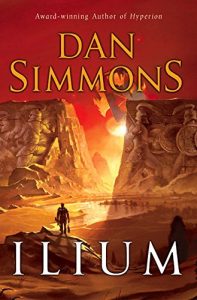 The problems with having no real standards are two-fold. 1) When you find something that’s really cool and worthwhile, people who let themselves be guided by such factors as quality or entertainingness will naturally suspect you of being up to your old tricks, and 2) you’ll find yourself being given to greater flights of hyperbole as a natural result of the first thing. Hyperbole is absolutely, positively, and I mean this 1000 percent, never effective. So, naturally, both of these are concerns of mine after having finished Dan Simmon’s Ilium.
The problems with having no real standards are two-fold. 1) When you find something that’s really cool and worthwhile, people who let themselves be guided by such factors as quality or entertainingness will naturally suspect you of being up to your old tricks, and 2) you’ll find yourself being given to greater flights of hyperbole as a natural result of the first thing. Hyperbole is absolutely, positively, and I mean this 1000 percent, never effective. So, naturally, both of these are concerns of mine after having finished Dan Simmon’s Ilium.
Okay, the easy stuff. I came into it knowing it was about the Iliad, and basically not knowing any more than that. This is okay, because both the title and the first couple of paragraphs make the same point. A couple of more things that I didn’t know coming in are that it’s also about Shakespeare, and H.G. Wells, and Proust (and a little bit, I claim, about Arthur Conan Doyle), and sentient robots living in the shadow of Jupiter, and pampered people living in an idyllic golden age on Earth. It’s about knowledge, and whether knowledge has value, and whether knowledge has intrinsic value. Most of all, it is about what the very best in science fiction is always about, what it means to be human.
Ah, you ask, but is it any good? Well, obviously you’re not really asking that, because a) you don’t trust me to know anyway, b) I already basically said it’s good, and c) how can that mix of plot, character and theme not be good? I mean, really, did you even read the second paragraph at all? Seriously, though. It’s great. When I finished it, I would not have hated the author if it had been almost exactly the same[1] and been one book instead of the first of two. At the same time, if the second book were out yet, I would go buy it and be reading it now, in express violation of my policy of not reading / reviewing books consecutively. I kind of resent having to wait until early July, as Amazon implies.
Thinking it over, I can’t even say that I miss the lack of frozen zombies. Thinking it over a little bit further, there’s a case to be made that it has the potential for frozen zombies after all, and that makes me feel better about myself. At the least, I can’t say I needed them in volume one, and that’s still saying a lot.
Incidentally: Can someone who has read this book contact me external to the site? I have a question that falls outside the scope of the review, about faxing and whether there was an authorial misstep or hints for the second book. And, can everyone who hasn’t read this book go ahead and read it? The world will be a better place. I actually kind of want to read the Iliad again now. No, really.
[1] Because, being two books, there are elements of the narrative barely alluded to that are sure to come into full relief in the second book. If he’d covered everything, then a second book would be silly.